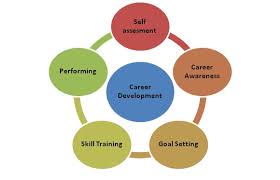Creating a personal career development plan is a crucial step in achieving long-term professional success and personal fulfillment. A well-structured plan not only provides clarity on your career goals but also outlines actionable steps to reach them. In this comprehensive guide, we’ll explore how to create an effective personal career development plan, including goal setting, skill assessment, and strategic planning. Whether you’re just starting your career or looking to make a change, this guide will help you build a roadmap to success.
1. Understanding the Importance of a Career Development Plan

1.1. Defining a Career Development Plan
A career development plan is a strategic approach to managing your career growth and professional development. It involves setting clear career goals, assessing your current skills and experience, and creating a roadmap to achieve your objectives.
1.2. Benefits of a Career Development Plan
- Direction: Provides a clear path and helps you focus on long-term career goals.
- Motivation: Keeps you motivated by setting achievable milestones.
- Skill Enhancement: Identifies skills and knowledge gaps that need to be addressed.
- Career Progression: Helps in planning for promotions and career changes.
2. Setting Clear Career Goals
2.1. Identify Your Career Aspirations
Begin by reflecting on your career aspirations. What are your long-term goals? What position or role do you envision for yourself in the future? Understanding your career aspirations is the foundation of your development plan.
2.2. SMART Goals
When setting career goals, ensure they are SMART:
- Specific: Define your goals clearly and precisely.
- Measurable: Establish criteria to track your progress.
- Achievable: Set realistic goals that are attainable given your current situation.
- Relevant: Ensure the goals align with your career aspirations and values.
- Time-bound: Set deadlines to achieve your goals.
Example: Instead of setting a vague goal like “I want to advance my career,” a SMART goal would be “I aim to become a senior project manager within the next three years by gaining relevant certifications and leading high-impact projects.”
2.3. Long-Term vs. Short-Term Goals
- Long-Term Goals: These are your ultimate career objectives, such as achieving a particular role or level of expertise. They typically span several years.
- Short-Term Goals: These are stepping stones to your long-term goals. They might include gaining specific skills, completing training programs, or achieving interim milestones.
3. Assessing Your Current Skills and Experience

3.1. Conduct a Self-Assessment
Evaluate your current skills, strengths, and areas for improvement. Consider your technical skills, soft skills, and experience. Tools like self-assessment questionnaires and career evaluations can provide valuable insights.
3.2. Seek Feedback
Gather feedback from colleagues, mentors, or supervisors. Their perspectives can help you identify strengths and areas for development that you might overlook.
3.3. Analyze Your Competencies
Compare your current skills and experience with the requirements of your desired role or career path. Identify any gaps that need to be addressed to move forward.
4. Creating an Action Plan
4.1. Develop a Skill Enhancement Plan
Based on your self-assessment, create a plan to develop the skills and knowledge needed to achieve your career goals. This may involve:
- Education: Pursuing further education or certifications relevant to your field.
- Training: Attending workshops, seminars, or online courses.
- On-the-Job Learning: Taking on new projects or responsibilities at work to gain experience.
4.2. Networking and Professional Development
Networking is crucial for career advancement. Build and maintain professional relationships through:
- Industry Events: Attend conferences, seminars, and networking events.
- Professional Organizations: Join relevant professional groups or associations.
- Online Platforms: Engage on platforms like LinkedIn to connect with industry professionals.
4.3. Setting Milestones and Deadlines
Break down your action plan into smaller, manageable milestones with specific deadlines. This will help you stay on track and monitor your progress effectively.
Example: If your goal is to obtain a certification, set milestones such as researching certification programs, enrolling in a course, completing coursework, and passing the exam.
5. Monitoring and Reviewing Your Plan
5.1. Regular Progress Reviews
Schedule regular reviews of your career development plan to assess your progress. This could be monthly, quarterly, or annually, depending on your goals and milestones.
5.2. Adjusting Your Plan
Be flexible and ready to adjust your plan as needed. Changes in your career aspirations, industry trends, or personal circumstances may require updates to your plan.
5.3. Celebrate Achievements
Acknowledge and celebrate your accomplishments as you reach your milestones. Recognizing your achievements can boost motivation and encourage continued progress.
6. Overcoming Common Challenges

6.1. Time Management
Balancing career development with daily responsibilities can be challenging. Prioritize your goals and allocate dedicated time for skill development and networking activities.
6.2. Maintaining Motivation
Stay motivated by regularly reviewing your goals and reminding yourself of the benefits of achieving them. Seek support from mentors, peers, or career coaches if needed.
6.3. Handling Setbacks
Setbacks are a natural part of any career journey. Use them as learning opportunities and adjust your plan accordingly. Persistence and resilience are key to overcoming challenges.
7. Conclusion
Creating a personal career development plan is a powerful way to take control of your professional future. By setting clear goals, assessing your skills, and developing a strategic action plan, you can navigate your career path with confidence. Regularly review and adjust your plan to stay on track and adapt to changes. Remember, career development is a continuous process, and a well-crafted plan will help you achieve your career aspirations and unlock new opportunities for growth.
With a solid career development plan in place, you are well on your way to achieving your professional goals and enjoying a fulfilling career. Start today and take the first step towards shaping your future!


